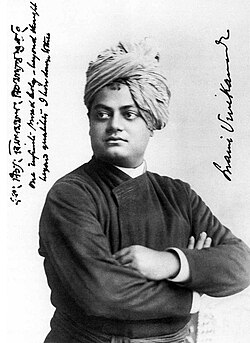Swami Vivekananda Quote
Feel nothing, know nothing, do nothing, have nothing, give up all to God, and say utterly, 'Thy will be done.' We only dream this bondage. Wake up and let it go.
Swami Vivekananda
Feel nothing, know nothing, do nothing, have nothing, give up all to God, and say utterly, 'Thy will be done.' We only dream this bondage. Wake up and let it go.
Related Quotes
One thing: you have to walk, and create the way by your walking; you will not find a ready-made path. It is not so cheap, to reach to the ultimate realization of truth. You will have to create the pat...
Osho
Tags:
advaita, consciouness, enlightenment, evolution, guru, healing, love, meditation, realization, satsang
A Strange Prayer:Dear Lord, I, the self searching illusion, has seen and experienced the outer world:relationships,success and failure,true friends, strangers and backbiters.I lived the different emot...
Saurabh Sharma
Tags:
advaita, author saurabh sharma, duality, god, inner voice, lord, mind body spirit, non duality, poem, poetry
With me, illusions are bound to be shattered. I am here to shatter all illusions. Yes, it will irritate you, it will annoy you - that's my way of functioning and working. I will sabotage you from your...
Osho
Tags:
advaita, consciouness, enlightenment, evolution, guru, healing, love, meditation, realization, satsang
About Swami Vivekananda
Swami Vivekananda (12 January 1863 – 4 July 1902), born Narendranath Datta was an Indian Hindu monk, philosopher, author, religious teacher, and the chief disciple of the Indian mystic Ramakrishna. He was a key figure in the introduction of Vedanta and Yoga to the Western world. He is credited with raising interfaith awareness and bringing Hinduism to the status of a major world religion in the late nineteenth century.
Born into an aristocratic Bengali Kayastha family in Calcutta, Vivekananda was inclined from a young age towards religion and spirituality. At the age of 18 he met Ramakrishna, later becoming a devoted follower and sannyasin (renunciate). After the death of Ramakrishna, Vivekananda toured the Indian subcontinent as a wandering monk and acquired first-hand knowledge of the often terrible living conditions of Indian people in then British India. In 1893 he traveled to the United States where he participated in the Parliament of Religions in Chicago. Here he delivered a famous speech beginning with the words: "Sisters and brothers of America ..." introducing the ancient Hindu religious tradition to Americans and speaking forcefully about the essential unity of all spiritual paths, and the necessity of embracing tolerance and renouncing fanaticism. The speech made an extraordinary impression. One American newspaper described him as "an orator by divine right and undoubtedly the greatest figure at the Parliament".
After the great success of the Parliament, Vivekananda delivered hundreds of lectures across the United States, England, and Europe, disseminating the core tenets of Hindu philosophy. He founded the Vedanta Society of New York and the Vedanta Society of San Francisco (now Vedanta Society of Northern California), which became the foundations for Vedanta Societies in the West. In India, he founded the Ramakrishna Math, which provides spiritual training for monastics and householders, and the Ramakrishna Mission, which provides charity, social work and education.
Vivekananda is widely regarded as one of the greatest figures of modern India. He was one of the most influential philosophers and social reformers of his time, and the most successful missionary of Vedanta to the Western world. He was a major force in contemporary Hindu reform movements and in the development of nationalism in colonial India. He is considered to be a patriotic saint. His birthday is celebrated in India as National Youth Day.
Born into an aristocratic Bengali Kayastha family in Calcutta, Vivekananda was inclined from a young age towards religion and spirituality. At the age of 18 he met Ramakrishna, later becoming a devoted follower and sannyasin (renunciate). After the death of Ramakrishna, Vivekananda toured the Indian subcontinent as a wandering monk and acquired first-hand knowledge of the often terrible living conditions of Indian people in then British India. In 1893 he traveled to the United States where he participated in the Parliament of Religions in Chicago. Here he delivered a famous speech beginning with the words: "Sisters and brothers of America ..." introducing the ancient Hindu religious tradition to Americans and speaking forcefully about the essential unity of all spiritual paths, and the necessity of embracing tolerance and renouncing fanaticism. The speech made an extraordinary impression. One American newspaper described him as "an orator by divine right and undoubtedly the greatest figure at the Parliament".
After the great success of the Parliament, Vivekananda delivered hundreds of lectures across the United States, England, and Europe, disseminating the core tenets of Hindu philosophy. He founded the Vedanta Society of New York and the Vedanta Society of San Francisco (now Vedanta Society of Northern California), which became the foundations for Vedanta Societies in the West. In India, he founded the Ramakrishna Math, which provides spiritual training for monastics and householders, and the Ramakrishna Mission, which provides charity, social work and education.
Vivekananda is widely regarded as one of the greatest figures of modern India. He was one of the most influential philosophers and social reformers of his time, and the most successful missionary of Vedanta to the Western world. He was a major force in contemporary Hindu reform movements and in the development of nationalism in colonial India. He is considered to be a patriotic saint. His birthday is celebrated in India as National Youth Day.
